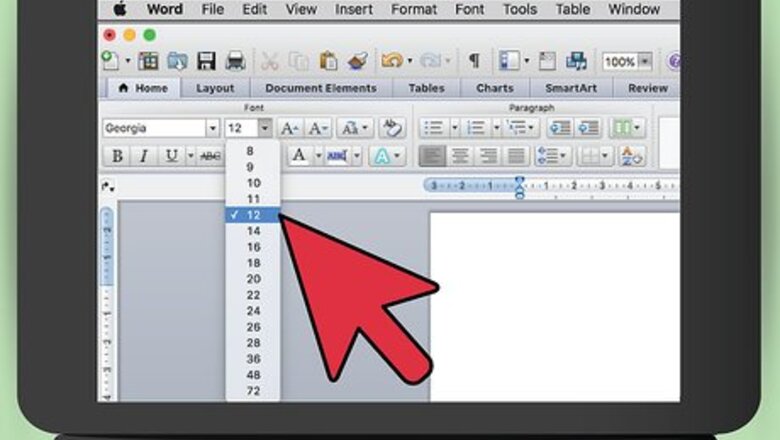
views
Beginning the Athletic Official Contract
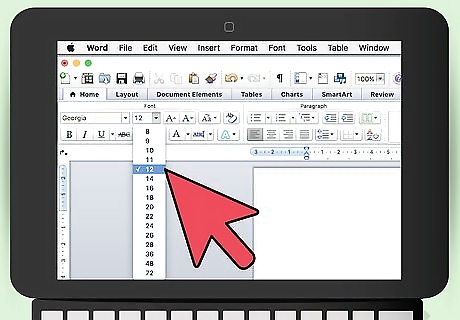
Set up your document. You should open a word processing document and set the font to a comfortable size and style. Times New Roman 12 point is fairly standard, though you can use anything as long as it is readable. If you have letterhead, then you should print the contract on your letterhead.
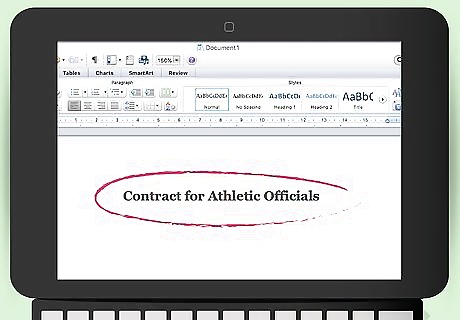
Title the document. You should title the contract “Contract for Athletic Officials.” Center the title between the left and right margins. Also put the title in bold. A few lines beneath, include space to enter the date of the contract.
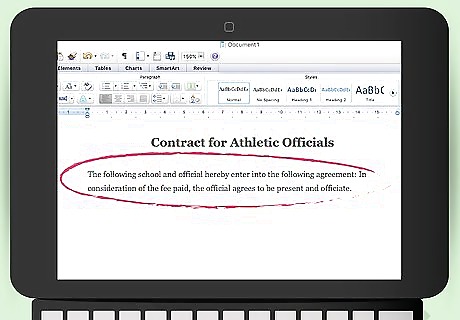
Include your mutual promises. A contract is an agreement between at least two parties. Each side must agree to do something or give something up in order for the contract to be legal. You should start the contract with an explicit agreement. Sample language might read: “The following school and official hereby enter into the following agreement: In consideration of the fee paid, the official agrees to be present and officiate.” With this sentence, you have stated what the school will do (pay a fee) and what the official will do (officiate). Consequently, you are creating a valid contract.
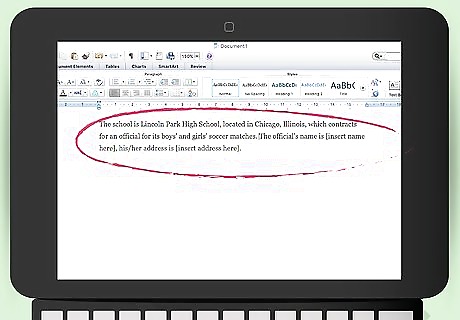
Insert information about the school. You need to identify both parties to a contract at the very beginning. You should include information about your school, where it is located, and the sport that will be officiated. Sample language could read: “The school is Lincoln Park High School, located in Chicago, Illinois, which contracts for an official for its boy’s and girl’s soccer matches.” If you are not a school but an amateur league looking to hire officials, then include the name and location of your league.
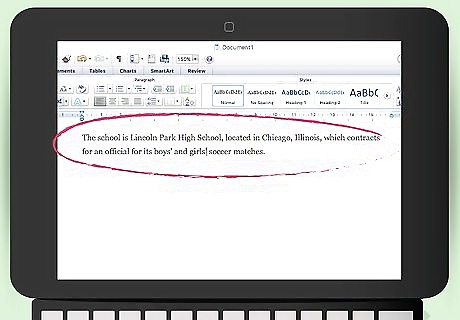
Add information about the official. You should also include spaces for the official to print or type his or her name and contact information. Make spaces for the following information: the official’s name the official’s address city or state
Adding the Contract Terms
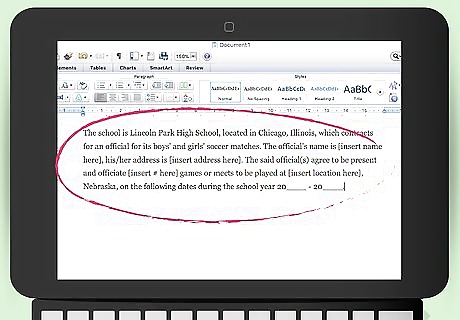
Identify which games the official will work. Beneath the information about the school and the official, you should add information about the games you have hired the official to work. At a minimum, include the following information: the date the game will be played the time of the game (day and hour) the place of the game the teams playing
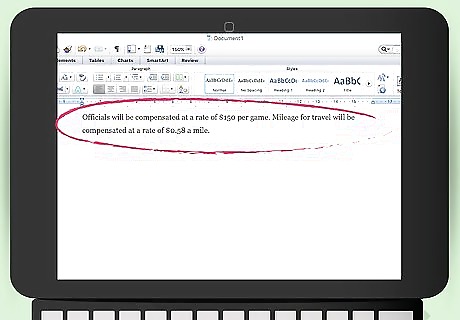
State how much you will pay the official. You should state how much you will pay the official per game officiated. Also include any expenses, e.g., mileage. Explain how mileage will be calculated. Sample language could read, “Officials will be compensated at a rate of $150 per game. Mileage for travel will be compensated at a rate of $0.58 a mile.”
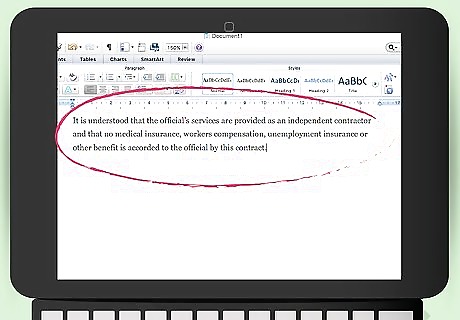
Identify the official as an independent contractor. In order to prevent an employer-employee relationship from being formed, you should explicitly state that the official is an independent contractor. This way, you do not have to pay unemployment insurance and other fees for the official’s services. Sample language might read, “It is understood that the official’s services are provided as an independent contractor and that no medical insurance, workers compensation, unemployment insurance or other benefit is accorded to the official by this contract.”
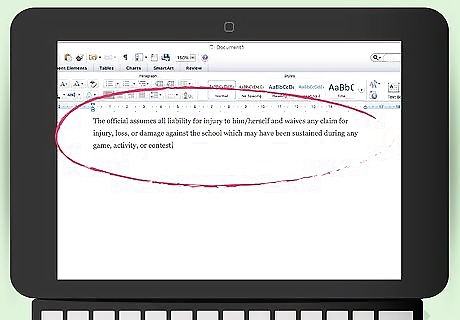
Include a waiver of liability in the contract. If the official is injured during the game, he or she may sue you. You can try to prevent a lawsuit by including a well-drafted waiver provision. Include something like the following: “The official assumes all liability for injury to him/herself and waives any claim for injury, loss, or damage against the school which may have been sustained during any game, activity, or contest.”
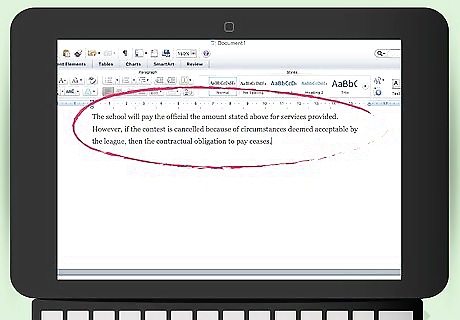
Explain how cancellations will be handled. Sometimes games have to be cancelled. The weather might not cooperate or other reasons might prevent the game from being played. You should clarify in your contract what will happen. For example, you might state: “The school will pay the official the amount stated above for services provided. However, if the contest is cancelled because of circumstances deemed acceptable by the league, then the contractual obligation to pay ceases.”
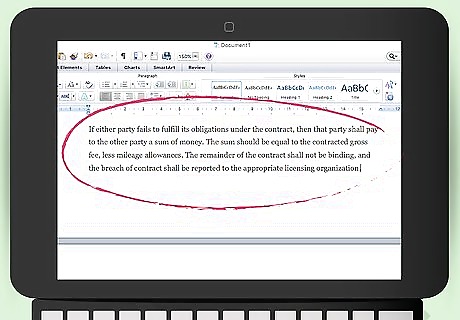
Explain what happens if one party breaks the contract. Either the official or the school might violate the contract. You should explain what will happen as a consequence. For example, the party that breaks the contract might have to pay the other party money. You should state how much. Sample language might read, “If either party fails to fulfill its obligations under the contract, then that party shall pay to the other party a sum of money. The sum should be equal to the contracted gross fee, less mileage allowances. The remainder of the contract shall not be binding, and the breach of contract shall be reported to the appropriate licensing organization.” Revise this language to suit your purposes. For example, you might want the contract to continue to be binding even if one party breaks it. In this situation, you can delete that sentence.
Executing the Contract
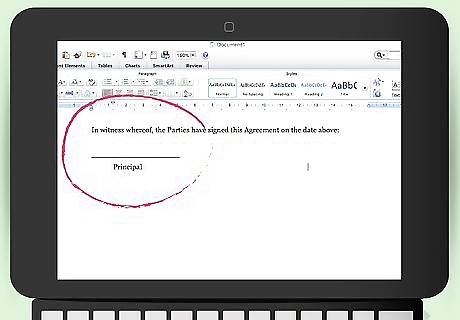
Insert a signature block for the Principal. You should have your official contract signed by the school’s Principal or another official, such as the Athletic Director. Include lines for the following information: the Principal’s signature the date the Principal’s school phone
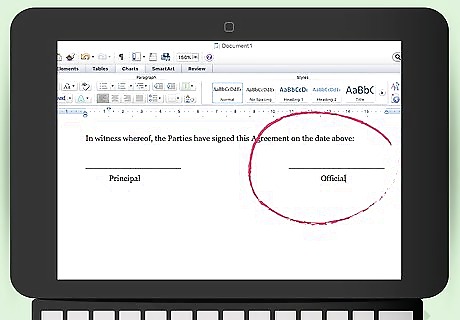
Insert a signature block for the official. The official should also sign the contract and provide relevant personal information. For example, make sure that there is a line for each piece of the following personal information: the official’s signature the date the official’s ID number (if he or she is a licensed official) Social Security Number home phone business phone
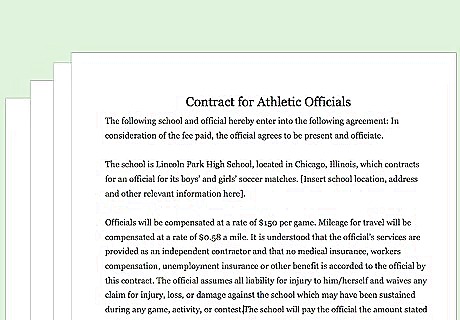
Distribute copies. After the official signs, you should give him or her a copy of the signed contract. Keep the original with your other contracts. For added safety, you can scan all of your contracts into digital format. Storing documents digitally makes it easier to access them. It also keeps a copy safe in case of a fire or other accident.
Preparing to Draft the Contract
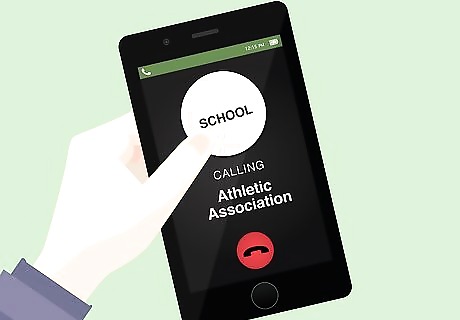
Check if your athletic association has a contract. Your school’s athletic association might already have blank contracts that you can use. You should call and ask. You can save time if you use the athletic association’s contract. The association might also require that you use their contract, so it is a good idea to find out ahead of time whether they have one. You may be an amateur sports league, unaffiliated with any school. In this situation, you should contact your city’s parks and recreations department. They may have a form contract.
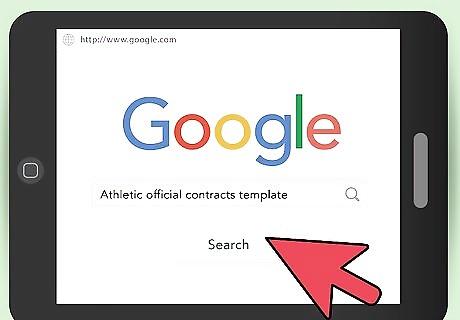
Find sample contracts on the Internet. Your athletic association might not have a contract. In that case, you should look for samples on the Internet. These samples can serve as guides as you type up your own. Athletic official contracts can differ substantially. Some contracts for athletic officials are short—only one page. They include basic information about the school and the official as well as the game to be officiated. Other contracts are much longer. These contracts are used as “collective bargaining” contracts when officials unionize. If you are contracting with a unionized group of officials, then you should have an attorney help you draft an agreement.
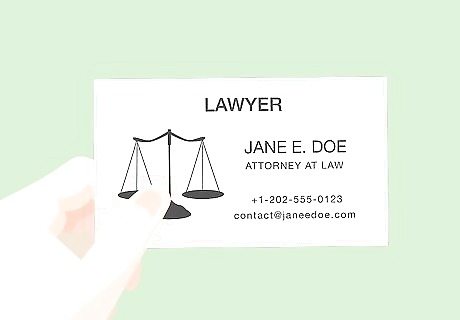
Meet with a lawyer. After you finish drafting your contract, you should show it to a lawyer to review. The lawyer can point out what is missing. If you wanted, you could also have the lawyer draft the athletic official contract for you. Your school should already have a lawyer. Ask the Principal or the school board who you use as a lawyer. If you don’t have a lawyer, then you can get a referral by contacting your local or state bar association. You can then schedule a consultation to meet with the attorney.















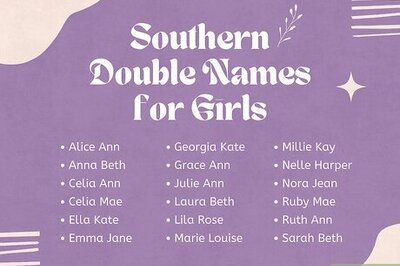



Comments
0 comment